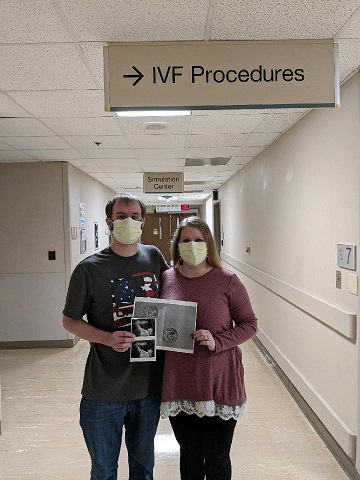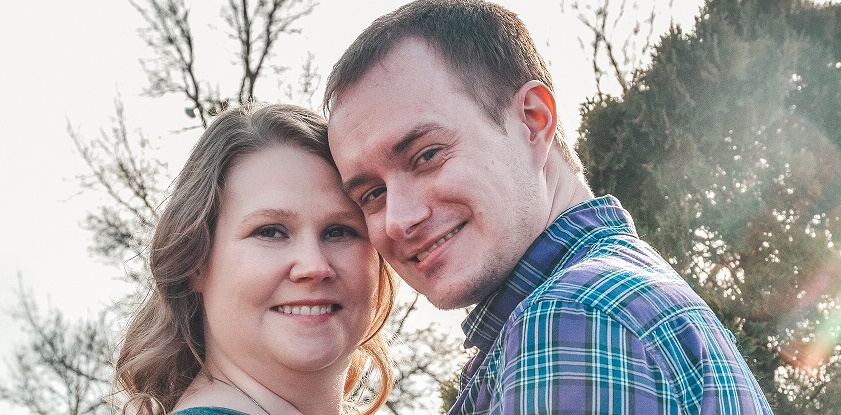Kaylee and Jesse Barr never thought having a baby would be such a challenge.
Since May 2017, the young couple started trying to have a family. Kaylee would conceive right away, but there would be a miscarriage about six weeks later. After one loss and trying hormone therapy for six months the couple from St. Joseph turned to in vitro fertilization (IVF).
“It is something we never thought we would do,” Kaylee said.
Two egg retrievals and seven embryo transfers later, the Barrs are now having not one, but two babies due Oct. 9.
Teresa Majers, NP in Reproductive Medicine, said, “I had the pleasure of working closely with Kaylee and Jesse for the last three years. We shared many tears over that time. I am impressed with the way they were able to continue with treatment after experiencing so many losses. Our entire team was over the moon with joy when they conceived this last time and to find out they are having twins was the icing on the cake. We all held our breath with every ultrasound, praying that the pregnancy would progress as hoped.”
Kaylee, 29, said all of their tests came back normal each time, yet the losses kept recurring. Their physician suggested a gestational carrier, but first they asked Lori Hollins, MD, associate medical director, Reproductive Medicine, to take a look at their case. Her suggestions regarding medication and giving the uterus time to heal worked.
After consultation with Dr. Hollins, they decided to transfer the last two remaining embryos to the uterus.
“This was like a desperation pass. Please let this work,” Kaylee said.
 April 18-24 is National Infertility Awareness Week and last December Carle started making it more convenient for families in east central Illinois to use a full array of reproductive services at Carle Urbana on Windsor. Leading the team is Dr. Hollins, a board certified reproductive endocrinology and infertility specialist and a member of the Society of Reproductive Endocrinologists and the Society of Assisted Reproductive Technology. A key component of success with infertility is seeing a physician with similar credentials as Dr. Hollins at a practice site.
April 18-24 is National Infertility Awareness Week and last December Carle started making it more convenient for families in east central Illinois to use a full array of reproductive services at Carle Urbana on Windsor. Leading the team is Dr. Hollins, a board certified reproductive endocrinology and infertility specialist and a member of the Society of Reproductive Endocrinologists and the Society of Assisted Reproductive Technology. A key component of success with infertility is seeing a physician with similar credentials as Dr. Hollins at a practice site.
“Couples should be aware that fertility starts to decline around age 28 and significantly over age 35 and even more over 40. Fertility treatment may be as simple as weight loss for both men and women or ovulation medications for women. Sometimes supplements or medication can assist with improving sperm count and sperm movement,” Hollins said.
Kaylee said the loss and challenges are tough. After their last loss in June 2020, they started sharing their story with friends and family to explain why they may not have been available when expected. “There are a lot of people who go through this and feel alone,” she said. “There are good days and bad days, but if it is what you want, keep trying and try to build a support system. Our parents and grandparents have been so supportive, which helped so much.”
At Carle, the physician, nurses and advanced practice nurses form close relationships with patients to help them navigate the complex process of testing, treatments, and assist with decision-making.
“Our team feels strongly that helping patients better understand their treatment options, success rates, insurance benefits and costs improves their overall experience. I believe this is one of the many things that sets Carle’s reproductive medicine center apart from other centers. Our staff genuinely loves what we do and enjoys educating patients,” Majers said.
Reproductive Medicine at Carle offers a variety of options that include ovulation medications combined with intrauterine inseminations for mild to moderate infertility, surgery for some patients with suspected endometriosis, and IVF when other methods fail. Hollins said some couples may need to do IVF right away due to advanced female age, blocked tubes or severe male problems.
Donor eggs are available for advanced female age, donor sperm is an option for LGBTQ patients and single women, and donor embryos are options when there are both male and female problems. The program also can support fertility preservation for cancer patients and transgender patients planning to transition.
“There are many considerations when doing IVF, but ultimately our work is about building families,” Dr. Hollins said. “We want you to have a healthy pregnancy, a healthy baby.”
For Kaylee and Jesse, they are starting to feel the normal joys of pregnancy and first-time parent fears as they bask in the hope and support that brought them to this point. “We embrace it every day,” Kaylee said.
Categories: Community
Tags: baby, fertility, in vitro, IVF, women's health
